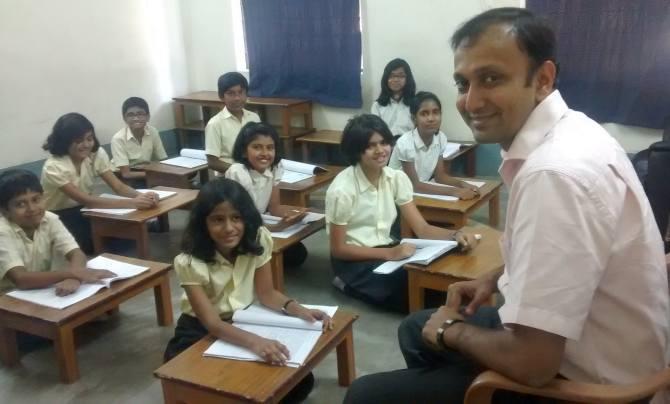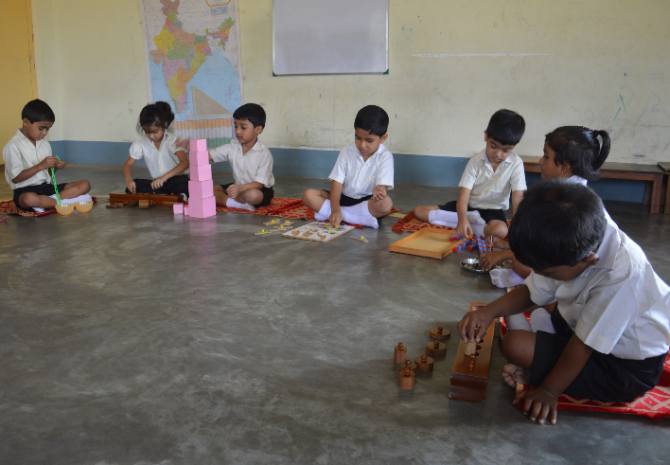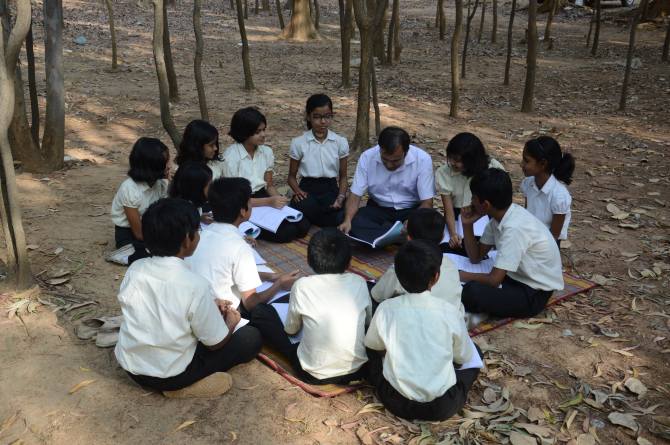Photographs: Courtesy: The Levelfield School Prasanna D Zore/Rediff.com
Arghya Banerjee, founder of The Levelfield School in Suri, West Bengal, on why he quit a high-flying job to teach India's young.
When Arghya Banerjee's daughter was about school-going age, he and his wife Asima, began searching for a good school. Most schools they visited advertised their advanced infrastructure. None pitched their teaching philosophy.
This was in 2007.
A year later Arghya quit a high-flying job -- he was co-head at Irevna, a research firm, now part of CRISIL -- to start The Levelfield School, a school that pretty much, like Phunsukh Wangdu in the iconic movie Three Idiots, is raising a group of young children and asking them to follow their dreams.
"Focus on developing skills, rather than acquiring degrees," Arghya says.
While the frustration of finding a good school for his daughter was the ultimate trigger for this IIT Kharagpur (a BTech in Electrical Engineering) and IIM-A alumnus to quit his job, Arghya had always wanted to fundamentally change the ways children learn or acquire knowledge in Indian schools.
"When we look back at our own school days, sometimes we feel we wasted a lot of time memorising useless facts. Did we really need to memorise in which year the third battle of Panipat happened?," he asks.
He wanted children to learn methods and practices that ensured they understood what they were learning.
"We spent the last three years to create a huge library of problems that test application-orientation and higher-order thinking," he says about the syllabus Levelfield has devised for students.
But just creating a module that enhances young children's learning abilities was not going to ensure his dream of imparting quality education at affordable price point.
So Levelfield, that currently teaches 300 students from lower kindergarten till Class VI teaches a comprehensive study programme that charges anywhere between Rs 1,600 to Rs 3,000 per month across these study levels.
As an entrepreneur Arghya now wants to spread his wings. From just one school as of now located in Suri, a small town and headquarters of Birbhum district in West Bengal, Arghya now wants to open more branches of Levelfield schools. Arghya, who has a marked irreverence for rote-learning and any educational system that promotes it, says "I want to do so with people who believe in what I am doing."
In this part-email and part telephonic interview with Rediff.com, Arghya speaks about his motivation, his plans, his challenges and the lessons learnt along his entrepreneurial journey.
Please click NEXT to continue reading
'Why don't we teach our kids to think, to analyse, to write, at the school level?'
Photographs: Courtesy: The Levelfield School
Why did you quit your cushy job and start The Levelfield School?
There were multiple influences.
I loved the teaching methodologies at IIM Ahmedabad -- which used stories, movies and real-life situations to teach concepts. For example, the concept of leadership may be taught by using examples from the movie Lagaan -- or the literary classic Don Quixote -- which is a far more effective way than memorising the definition of leadership! I wanted our schools to use such methods which make learning impactful as well as enjoyable.
Post IIM-A, when I was co-head of Irevna I experienced what every Indian corporate leader experiences -- a talent crunch.
Of course, there were many CAs and MBAs that we hired, but I felt after so many years of education in schools and colleges, they still lacked in simple skills like communication or logical thinking. Though we designed an elaborate training programme to rectify that, I felt that was a late intervention.
Why don't we teach our kids to think, to analyse, to write, at the school level?
The final trigger was when my daughter was ready to go to school. When I tried to search for a suitable school for her, I felt most schools advertise infrastructure rather than teaching philosophy.
It's at that point I decided to set up a school where kids will learn real skills, and not memorise facts.
I decided to set up a school where learning will be fun yet effective.
Please click NEXT to continue reading
'Parents are now much more convinced that this is the right way to go'
Photographs: Courtesy: The Levelfield School
What were your challenges? How did you overcome them?
A big part of the challenge we faced had been about educating the parents of school children about our methodology.
We at Levelfield teach our children quite differently.
At the primary level, there is an intense focus on basic skill development. For example, we have a strong emphasis on reading skill. There are no set textbooks -- rather, we want our children to learn to read better by reading 20-25 story books over the course of a year.
We rewrite old classics by simplifying the language so that even a primary level child can read those. We want our children to communicate cogently, so there are a lot of debates, discussions and participation in the classrooms.
In math too, we want children to develop the ability to think and logically analyse things.
We want them to solve different type of problems every day so that it becomes a habit for them. For example, we ask them to solve kid-friendly versions of Japanese puzzles like Sudoku, Shikaku, Kenken.
As a result, parents tend to sometimes feel worried about lack of conventional textbooks in our school. They tend to fret about lack of homework.
We then tell them to measure output rather than input.
Our kids perform extremely well in standardised tests like ASSET or McMillan. In fact, almost all of our kids are in the top 15 percentile in the country according to standardised test scores, with many in the top one per cent.
External visitors to our school are awed by the fluency and articulation of our kids. We tell the parents more time spent (studying) is not necessarily good. There is no point running very fast in the opposite direction.
We hold several group sessions with the parents explaining our methodology. In addition to explaining our teaching methodology, we talk about how the world is now moving towards more skill-based learning.
Small-town parents mostly work in the government sector, and most government job exams still test rote-learning.
So we talk about the fact that now a greater number of jobs are offered by the private sector, and private sector demands real-life skills.
We talk about how CBSE or ICSE boards have moved away from rote-learning and now ask questions that test higher-order thinking skills. After many such sessions, and after seeing the results of the students, parents are now much more convinced that this is the right way to go.
Please click NEXT to continue reading
'Focus on developing skills, rather than acquiring degrees'
Photographs: Courtesy: The Levelfield School
Tell us about your revenue model
I started the first Levelfield School in Suri, West Bengal four years ago. Now that it has acquired a strong reputation, locally and externally, and now that we have developed a large amount of proprietary teaching materials -- I intend to partner with real-estate developers to set up more schools.
I would like credible partners who would set up infrastructure for us, and we would take the full operational responsibility -- and we could have a revenue sharing arrangement.
In addition, over time, I also intend to look for technology partners to disseminate our teaching modules (e.g. reading skill development module), through Android or IOS applications.
My goal is to wage a battle against rote-learning and to have maximum number of children benefit from the methods we have developed at Levelfield.
Values and lessons learnt in life
The last four years have taught me that as an entrepreneur, there will be bad days. There will be days when you may have your back to the wall. The only thing that will sustain you is an uncompromising belief in your product.
At Levelfield, I have been uncompromising in my belief that we need to fight rote-learning in all its forms. If that means throwing away all the existing pretenses of learning -- the hours spent doing homework, the effort spent memorising textbooks, the rigid subject boundaries -- we must do all of that.
I have never taken a single step to become a 'more conventional' school, more acceptable to my audience.
I knew acceptability will come through results.
Advice to India's youth...
- Focus on developing skills, rather than acquiring degrees.
- We are a nation where we spend too much time studying and too little time learning.
- Read books, watch movies from all over the world, travel, connect with interesting people, learn the latest technology.
- Explore real avenues of learning.
- Always remember, education is a preparation for work and life. Do not run away from actual work-life by endlessly pursuing degrees.





Comment
article